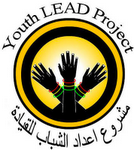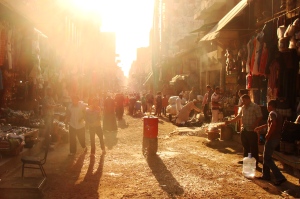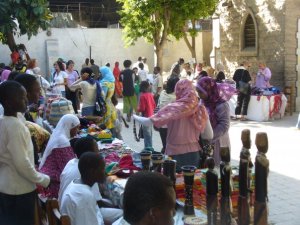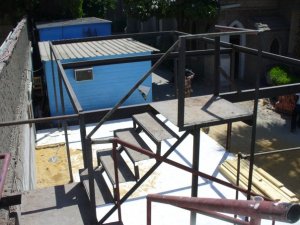A lion, a zebra, a dolphin, chameleon and turtle are illustrated on the whiteboard. The walls around me are covered in posters, with words written by the hands of those new to English. I begin thinking about how the imperfections I so easily pick out in their English are probably just as visible in my attempts to write in Arabic. Students begin to filter into the classroom, and a familiar language that I can’t comprehend begins to fill the air. Three o’clock comes and the eyes of the class focus on the animals in the front of the room. I am sitting in on a session of a Refugees United for Peaceful Solutions (RUPS) conflict resolution course, and as the class begins, I learn that each of these animals represents a different style for conflict resolution. Students discuss the merits of each style in Arabic, and I am left depending on my nonverbal senses to figure out what is happening. There is no shortage of information. The members of the class are enthusiastic about their discussion, and participation is easygoing and ubiquitous. Their faces and bodies show me their passion even as the meaning of their words escapes me.
After the class is over, I timidly approach the leader of the discussion, Amira, for an interview. The response I get is overwhelming. I end up with not just one interviewee, but Kathy Kamphoefner, co-director of St. Andrews, asks the rest of the RUPS graduates to talk with me and soon I am surrounded by nine people. Since I had just found out I would be sitting in on this session an hour prior, I don’t have a comprehensive list of questions, but it doesn’t matter. Excitement exudes from the faces of everyone surrounding me, and some people are quite literally on the edge of their seats, waiting for their turn to share their experiences.
The RUPS leaders begin to explain their mission to me. Refugees come here to Egypt and inevitably face conflicts with one another and the Egyptian population. Cultural and dialectic differences as well as arguments over rent or territory cause tension and sometimes violence in the refugee communities. The RUPS program is committed to the prevention of violent solutions and uses conflict resolution techniques to solve problems. The graduates of the program use the skills they have learned to help mediate disagreements and teach conflict resolution methods to the members of their communities.
The organization was originally just classroom sessions in the Adult Education Program at St Andrews, but has since evolved into its own separate organization. The program began in January 2008 as one trial class. Those first students would go on to form an advanced class that would write the charter and goals for the RUPS organization. Refugees United for Peaceful Solutions is now comprised of three separate levels, a beginning class, an advanced class and a class for training new RUPS teachers.
The impact of the RUPS program becomes very clear to me through the stories of its graduates. A woman named Amani tells one of her favorite stories about the application of her RUPS training. She lived in an apartment building where two men were at odds with each other, and there seemed to be no resolution in sight. Using her skills as a RUPS graduate, Amani served as a mediator for the conflict, and now the former adversaries are the best of friends. It is an encouraging story, but I quickly realize it is not unique to Amani. Everyone in the group has had a similar experience, and it is heartwarming to see just how committed the members are to their roles as educators and mediators. The inspiration this program has provided these refugees is astounding. In fact, optimism is the defining characteristic of the group. The members not only have hopes for refugees in Egypt, but many hope to one day return home to bring this sort of mediation to their communities. Abdel Rahim is a particularly optimistic RUPS leader. He makes no effort to restrain the smile that spreads over his face as he speaks. “The RUPS program is very nice. The reason I say it is very nice is because if we study here and the community knows this is the way of negotiation, we can end violence.”
The classroom session that I sat in on was a relatively new evolution in RUPS. Until recently classes were only offered in English, but demand was so great that Arabic classes had to be added. It seems that since it began, RUPS has just continued to grow. Recently, graduates of the program were hired to provide mediation training for the Psycho Social Training Institute of Cairo. Kathy Kamphoefner, Co-Director of St. Andrews, has faith that the organization will continue to expand. “The next step is to take training out in to the refugee communities,” she says. “We have already been in contact with members and they have been receptive to the idea.” It seems unlikely RUPS will stop expanding, and the city of Cairo is better off for it.
~
This post was written by Sean Eagan, a volunteer with StARS since March 2010.
The Prospect of Peace
April 12, 2010We’ve moved! Find our latest blogging at our new address!
December 9, 2009StARS’ blog can now be found at www.standrewsrefugeeservices.wordpress.com
Legal Aid Project News
November 15, 2009 It’s not just Egypt’s soccer team that is getting results! In the past several months, the Resettlement Legal Aid Project (RLAP) at Saint Andrew’s has continued with its core work—resettlement assistance for refugees seeking permanent relocation outside of Egypt—but it has also been developing an array of additional programs. We are in a phase of expansion at RLAP on a variety of fronts: we are expanding our staff, broadening the types of services we provide to our clients and, while our clients remain predominantly Iraqi, we are reaching out to other refugee communities in Cairo.
It’s not just Egypt’s soccer team that is getting results! In the past several months, the Resettlement Legal Aid Project (RLAP) at Saint Andrew’s has continued with its core work—resettlement assistance for refugees seeking permanent relocation outside of Egypt—but it has also been developing an array of additional programs. We are in a phase of expansion at RLAP on a variety of fronts: we are expanding our staff, broadening the types of services we provide to our clients and, while our clients remain predominantly Iraqi, we are reaching out to other refugee communities in Cairo.
We have had tremendous success with resettlement recently. On October 17th, 7 of our clients were resettled to new lives in the United States. Read the rest of this entry »
Peace Breaks Out
November 9, 2009
Youth LEAD Project Two weeks ago, the St. Andrew’s office was abuzz with news – youth in three areas of Cairo, who had previously maintained violent rivalries, had agreed to a peace treaty. Phones of the Youth LEAD staff were ringing incessantly, the excitement of the young men buzzing at the other end. The night before, over 70 young men had met and agreed to peace.
The real story here is that this is not just any other peace agreement. This agreement was generated among the young men themselves after a respectably long period of non-violence, without the intervention of the staff at Youth LEAD – though quietly encouraged and supported.
Within these youth and youth in other communities prone to gang violence, numerous peace treaties have been established. However, such peace treaties are often brought about due to initiation from outside, well-intentioned but misguided mediators. What often results is a declaration for peace that looks pretty on paper, but is really just a conglomeration of empty words in the name of peace. Read the rest of this entry »
Community Profile: Letting Mothers Be Students – New Preschool
October 28, 2009For the past three years, Someya, a young Sudanese refugee, has attended evening English classes at St. Andrews. If asked what fuels her passion for learning, she’ll give an easy smile and tell you about the lifelong importance of pursuing knowledge, as well as her desire to speak with others directly, in their own language. It’s an answer we all know well. But Someya’s dedication to self-improvement through education is completely sincere. One year ago, her ability to continue her English lessons was jeopardized by the birth of her son Farris-–a blessing mixed with an ironic twist. Because her husband has been working in the United States for the past seven years, Someya would have no choice but to shoulder childcare of their son all on her own.
At St. Andrew’s, this is a familiar story, and often, the tale is succeeded by a mother’s absence from classes for two – four years until the child can be more easily babysat by neighborhood mothers. Absence from classes means these mothers lose much of the language and literary skills they have accrued in St. Andrew’s courses, and even worse, they must abstain from vocational training that offer much needed income-generating opportunities.
Dedicated single mothers like Someya shouldn’t have to sacrifice their personal development for the sake of their children, but without help from their communities, there is precious little time to devote to one’s self. Fortunately, starting last spring, informal free childcare services offered to students of St. Andrew’s adult evening classes meant that Someya didn’t have to choose between caring for her new baby and her own personal enrichment. Read the rest of this entry »
Community Profile: Chasing Health from Iraq to Egypt
August 3, 2009 One of a series that we hope to initiate, profiling some of the staff and community members at St. Andrew’s.
One of a series that we hope to initiate, profiling some of the staff and community members at St. Andrew’s.
—
“With all the loss that people have, money will be the least that you care about,” he advised me as we discussed the extortionist fees charged by local banks. I was surprised by such a blasé attitude towards personal finance from someone who had been forced to flee his country and with it his lucrative future as a doctor. By the end of our conversation it made more sense.
He had seen his father die in his own arms. A soldier had held a gun to his head and told him to revive a fallen comrade who was clearly dead. His aunt was dying of a brain tumor. The woman who had raised his parents had died of heart failure. His own mother was showing signs of mental unease. An Iraqi doctor working in an Iraqi hospital, he had seen more unnecessary death during his residency than many doctors see in their entire careers. Dead bodies peppered his commute to work; sectarian expenditures tossed to the roadside like spent bottles. The body of a coworker was amongst them; a doctor shot dead on his morning commute. If there was one thing he learned during this time, it was that “there is nothing that will be with you forever.” A sad truth from a man who seemed only to want happiness.
StARS June Bazaaar, Oh My!
July 13, 2009
Getting started at the June Bazaar.
St. Andrew’s had yet another successful Bazaar this June. On the 27th, we invited everyone in the greater St. Andrew’s community to come enjoy dance and music performances in Guild hall. We had booths selling wares from North and East Africa , henna artists, and some amaaazing food. More than a few of our volunteers took both their lunch and dinner at the bazaar.
We are all well aware that St. Andrew’s always has a very distinct feel from the rest of its Cairenes surroundings, but on the 27th, the atmosphere at St. Andrew’s was utterly jubilant. With revelrous dancing, bursts of music, food to fill our bellies and cool drinks to hold back the heat, artists displaying their works to “ohhs” and “ahhhs,” and a sense of community comfort that we’ve come to love being apart of here. We can’t wait until the next one!
What Does Being a Refugee in Egypt Mean?
July 1, 2009This is a complex question that comes up often in our work at St. Andrew’s. Refugee status in Egypt is not always a easy thing to understand. Even if you’re familiar with the term “refugee,” what that status practically means changes from country to country. Questions our volunteers often have: who decides who is a refugee in Egypt? Do refugees receive services from the state? How do they subsist in Egypt? What does an individual’s refugee status mean to their legal existence? Their social existence?
The Egyptian Organization for Human Rights took time years ago to explain a little about refugee in Egypt and we can’t do much better in explaining than they did. So here you are–a brief review. Read the rest of this entry »
New and Improved
May 17, 2009
We've made stairs for the newly renovated 2nd floor of the bowab's old house (now housing the RLAP office) and a small set of stairs to connect to the temporary classrooms not yet built. You can see the hope we have in providing quality education to refugees physically manifested--stairs to a room not yet built or funded!
We’ve begun renovation on our old bowab’s (doorman’s) building, which now houses the Resettlement Legal Aid Project. The office was moved into this small structure after its first floor was partially renovated in August ’08 to at least get the office’s legal services up and running. But finally, nearly nine months later, we’re fixing the second floor that has been in a sincere need of essential restructuring, a new roof, and what we’re most excited about, a secure stairway!! You cannot imagine the excitement a simple case of metal stairs can bring to a community! Thank you everyone who made this possible and we look forward to putting the renewed space to good use!
~ StARS team, since 1979
Going Virtual, A First (Fresh) Start
May 4, 2009Hi! Welcome!
Welcome seems a little strange to say because, to be honest, St. Andrews is new to this too! We’re trying blogging for the first time in order to make an effort to keep up with our wonderful volunteers as they spread across the globe and the many others that support our work through other means: donations, advice, and sometimes just virtual cheer leading.
For those who are new to StARS:
St. Andrew’s Refugee Services (StARS) is a multi-program refugee community center in Cairo, Egypt. We provide programming to refugees from Southern Sudan and Darfur, Somalia, Eritrea, Iraq and other nationals from 32 different countries. Services are delivered to refugees based on need and without discrimination of gender, ethnicity, national origin, tribe, or religion, while refugee staff members help guide the programming of StARS.
Our year-round programs include the Children’s Education Program (CEP), Adult Education Program (AEP), African Refugee Cooperative (ARC), Legal Aid Project (RLAP), and Youth Leadership, Education and Access to Development (Y-LEAD). These programs offer in-depth services to approximately 1500 refugees annually. And though we always push to do more, we’re really proud of them!
To those who know us:
Thanks for visiting us–virtually, this time–and message us on here if you want to write something about your experience with StARS! From everyone on the StARS staff, hope this aptly chronicles a bit of what we do in Egypt’s megalopolis, Cairo.
~ Susannah, Development Officer and StARS fan since 2004, when I was volunteer English tutor



 Posted by St. Andrew's Refugee Services
Posted by St. Andrew's Refugee Services